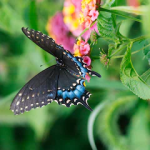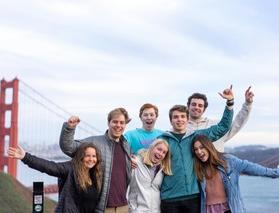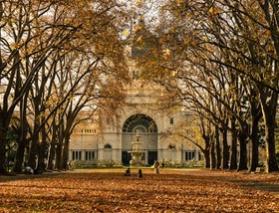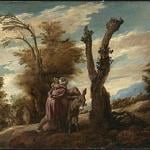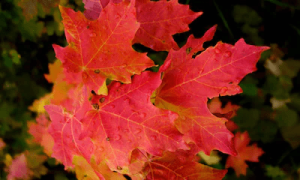
My kindergarten student held out an autumn leaf that was part green and part red. “Look Teacher—it’s lost half its chlorophyll!” he exclaimed. The class had wondered why leaves change color. During the dinosaur age, before classrooms and teachers all had personal computers, I wrestled after hours with an encyclopedia. As days are shorter in autumn, the (green) chlorophyl in the leaves is burned off, and the leaves’ inner colors show. I enjoyed sharing wonders with my five- and six-year-olds. (Their second favorite topic was plants that trap and consume insects and other tiny animals.) As years and deeper understanding have further opened my mind in worshiping the divine creator, I still cling to my need to wonder.
A Blessing to Wonder
From breathtakingly beautiful butterflies to the incomparable pink blobfish (certified seventh ugliest creature on earth), nature furnishes us with a variety of creations only a professional ethnobotanist could begin to imagine.
World renowned ethnobotanist Paul Cox (2022) refers to “Nature’s Curiosity Cabinet” in which wonders await us to discover and utilize. He urges all to “increase our sense of wonder of the earth.” Having had parents professionally involved in biology, Dr. Cox recalled, “Ever since I was a little boy, I’ve prayed for the plants and the animals that Heavenly Father created.” His own children have also prayed as they began to wonder. [1]
Having researched and written on children’s literature and on children with disabilities, I love A Boy and a Jaguar (2014). In this picture book, Alan Rabinowitz shares with children his childhood life as a boy who stuttered so badly that he could not talk with people. But he could talk with animals in perfect clarity.
Alan promised his pets and the jaguar he loved to visit in the Bronx Zoo that if he ever found his voice, he could “be their voice.” As an adult, Rabinowitz found his voice as a world-recognized expert studying, advocating, and building preserves not only for jaguars, but for leopards and “other wild cats.”
Other children who have difficulty communicating with humans are drawn to the feelings they share with animals. Individuals with autism have language skills ranging from no oral language to genius levels of reading and math, but their brain wiring makes it hard for them to relate and communicate with other people.
Stables, ranches, and other appropriate places offer opportunities for children with autism to ride horses (carefully led and supervised). Parents can share the time to wonder. The mother of an enthusiastic rider looked out over the beautiful distant landscape and wrote, “It’s extremely peaceful out here in horse land” (her term).
To Worship as a Steward
Gérald Caussé (2022) told us that as we think to wonder at the beauty around us, our emotions “kindle within us a deep sense of gratitude for our Heavenly Father and His Son, Jesus Christ, who created this magnificent earth.” And he added, “The divine gift of the Creation does not come without duties and responsibilities.”
Both Presiding Bishop Caussé and ethnobotanist Paul Cox use the Lord’s term “steward” to indicate what we must do. “For it is expedient that I, the Lord, should make every man accountable, as a steward over earthly blessings, which I have made and prepared for my creatures” (D&C 104:13).
The Lord assigns us stewardship, but “retains full ownership” (Caussé, 2022). The earth and everything in it belongs to God. As He taught, the blessings of this earth were intended “to be used, with judgment, not to excess, neither by extortion” (D & C 59:20). Spencer W. Kimball (1977) referred to stewardship as “a sacred spiritual or temporal trust.”
Dr. Cox is known worldwide for saving natural rainforests from destruction. Obviously, very few work on that level of stewardship. With the violent storms, widespread flooding, uncontrolled wildfires, and brutal war endangering stewardships worldwide, we may feel helpless to do very much. But Dr. Cox (2022) made three suggestions that can increase a common person’s ability to wonder and be useful.
-
- Spend time experiencing and appreciating nature.
- Support our national parks.
- Stand “against climate change” in your stewardship to care for trees or house plants at home.
President Nelson (2000) has added to caring and stewardship that we must share the earth lovingly with others and must preserve resources of the earth for future generations. Hc has promised us “great spiritual blessings” as we add his perspective to our desire to wonder and to worship at the creations of the Lord.
A Favorite
May I close with a verse from a favorite song as a testimony of the Savior’s creations and His love.
He clothes the lilies of the field.
He feeds the birds in the sky,
And He will feed those who trust Him,
And guide them with His eye.
(Roger Hoffman, “Consider the Lillies of the Field,”( 2003, www.musixmatch.com)
[1] Quoted and cited by Anne Billings, “You Can Make A Difference: Paul Cox—Preserving God’s Creations,” Liahona, November, 1998 https://www.churchofjesuschrist.org/study/liahona/1998/11/paul-cox-preserving-gods-creations?lang=eng



